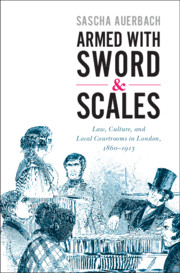CUP is publishing a social
history of the London courtroom during the period 1860-1913.
ABOUT THE BOOK
In the mid-eighteenth century,
author and magistrate Henry Fielding adjudicated cases of theft, assault, and
public disorder from his London home on Bow Street. By the middle of the
nineteenth century, Fielding's modest 'police office' had expanded to become
the most prolific court system in Britain and the cornerstone of criminal and
civil justice in the metropolis. Sascha Auerbach examines the fascinating history
of this institution through the lens of 'courtroom culture' – the combination
of formal statute and informal custom that guided everyday practice in the
London Police Courts. He offers a new model for understanding the relationship
between law, culture, and society in modern Britain and illuminates how the
local courtroom became a crucial part of everyday life and thoroughly entangled
with popular representations of justice and morality.
ABOUT THE AUTHOR
Sascha Auerbach, University of
Nottingham
Sascha Auerbach is a Lecturer in
Modern British and Colonial History at the University of Nottingham. A former
Fulbright Scholar, he is the author of Race, Law and 'The Chinese Puzzle' in
Imperial Britain (2009).
TABLE OF CONTENTS
Introduction: Courtroom Culture
1. 'Many-Coloured Scenes of
Life': The Police Courts in Metropolitan Culture and Society, 1758–1860
2. 'A Ruffian Rightly Punished':
Morality and Local Courtrooms in Practice and Portrayal, 1860–1880
3. 'An Evil Quarter of an Hour
About the Precincts': Urban Reform and Municipal Authority in the Courtroom, 1870–1902
4. 'Two Shillings' Worth of
Revenge in the Form of a Summons': The Integration of Courtrooms and
Communities in London, 1882–1902
5. A Poor Woman's Court of
Justice, 1882–1910
6. 'The Very Centre of
Observation and Information': Constables, Magistrates, and Changing Patterns of
Prosecution and Punishment, 1880–1913
Conclusion: The Historical and
Cultural Legacies of the London Magistrates Courts.
More info here


No comments:
Post a Comment